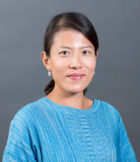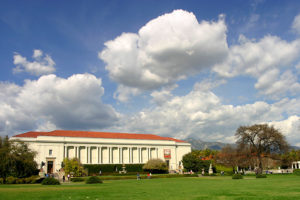Professor Penelope Geng Receives Prestigious Fellowship
Contact
The Words: Macalester's English Student NewsletterSenior Newsletter Editors:
Birdie Keller '25
Daniel Graham '26
Callisto Martinez '26
Jizelle Villegas '26
Associate Newsletter Editors:
Ahlaam Abdulwali '25
Beja Puškášová '26
Sarah Tachau '27
Peyton Williamson '27
Laura Berglund ’20

Early Modern Literature and Shakespeare Professor Penelope Geng was recently awarded the Francis Bacon Foundation Fellowship from the Huntington Library in San Marino, California. This nearly one hundred year old private institution is open to both scholars and the general public; its collection of seven million manuscripts and 430,000 rare books includes the Ellesmere manuscript of Chaucer’s Canterbury Tales: a fifteenth century illustrated edition of the text. One of the twelve remaining vellum copies of the Gutenberg Bible and editions of Shakespeare’s plays that were published during his lifetime can also be found in the library.
The Francis Bacon Foundation Fellowship centers on Renaissance and British literature, and recipients are given one to five month grants to pursue scholarship in this area. Professor Geng plans to take advantage of this opportunity to continue working on her book Communal Justice in Shakespeare’s England. The Huntington offered a two month grant, and the college matched it so that Professor Geng can spend a full semester at the institution.
Professor Geng explained the book’s premise during a recent interview:
“It’s an attempt on my part to reconstruct a cultural moment in which the law as we know it was still very much in its sort of nascent state as a profession, was still developing its own internal discourse, it was still sort of thinking through what does it mean to be a legal professional, what does it mean to claim legal expertise, or legal authority through one’s training in the law schools.”
At the moment, Professor Geng is especially interested in studying assize sermons, which are sermons that were preached at legal trials. These texts illustrate some of the intersectionality that was present in England during Shakespeare’s time.
“What really intrigues me about these sermons is that it really brings together a very popular, general understanding of law and morality and state power and also this issue of lay magistracy, which is the topic I’m really interested in.”

Also, the opportunity to engage with these texts in their physical form, rather than as electronic facsimiles, has the potential to bring out the contextual significance of the work. Professor Geng offered an anecdote to illustrate the significance of a text’s physicality.
“I remember a few years ago I was researching all these Protestant polemics, and these were sort of pamphlets, short treatises written by Protestants during the counter reformation in England during the reigns of Mary I and Philip II, who were Catholic monarchs in England. And so it was illegal to print these books, to circulate them, so these were clandestine, banned books. And I didn’t appreciate the sort of furtive nature of this kind of reading until I saw a copy of one of these polemical treatises, and it was tiny, it was like the size of my cell phone, or even smaller, actually, small and thin. And what that suggested to me was that it could easily be slipped into a pocket or hidden in a backpack, so it really reinforced the sense that this is dangerous literature, and yet it’s a text that was in circulation, that people read, they used to inspire them to renew their faith in Protestantism. So for me, yes a lot of the books, it’s true, a lot of the texts I need for my research are available on databases. So fortunately Macalester has access to the Bow Early English Books Online, and it’s a wonderful database, it basically offers you facsimile copies of early printed books … But when you look at the book in facsimile it’s not really possible to get a sense of what it is, the materiality of the book is still kind of very elusive, even if you’re looking at a very good facsimile of the book.”
Other texts in the Huntington’s collection, such as manuscripts, are inaccessible outside the institution because they are not available online. Commonplace books in particular are a type of manuscript Professor Geng is planning to study. Because they are similar to diaries, Professor Geng described how commonplace books are valuable to her work.
“[T]hese lawyer’s commonplace books offer some insight into what lawyers wanted to keep for memory’s sake, so these are kind of like day journals or diaries but arranged thematically … these are very personal objects and they give us a sense of how lawyers were understanding their own profession and how they were listening to sermons and what they found most useful for their work.”
Looking back on our conversation, I thought about my experience in Professor Geng’s Intro to Shakespeare class and the selections from The Bedford Companion to Shakespeare we often read alongside the plays themselves. The combination of primary sources and contemporary framing made it easier to understand the time Shakespeare wrote in and to relate his work to the present. I suspect that Professor Geng’s students in the coming years will have similar experiences while encountering some of her discoveries from the Huntington.
On behalf of The Words and the English Department, congratulations to Professor Geng on having received this fellowship! We can’t wait to see the amazing work she’ll do!